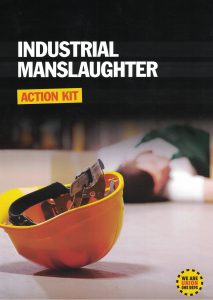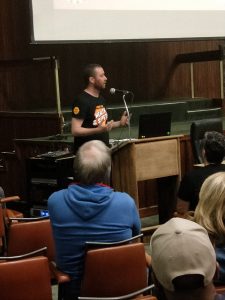 The Victorian trade union movement is preparing for the November 2018 State Election with one element of that campaign being the advocacy of Industrial Manslaughter laws.
The Victorian trade union movement is preparing for the November 2018 State Election with one element of that campaign being the advocacy of Industrial Manslaughter laws.
At the end of January 2018, the unions “kicked off” their campaign with a meeting which reviewed the challenges and wins for injured workers in 2017 and outlined their intentions for 2018. The Industrial Manslaughter Action Kit included a petition which says:
“We need Industrial Manslaughter laws in Victoria.
We call on Daniel Andrews to provide a safer Victoria and ensure no-one is above the law. we call for legislation so negligent employers and senior managers can be charged with industrial manslaughter when a person is killed at work.”
The unions are taking inspiration from Queensland for the structure of the industrial manslaughter laws. It can also be said that they are also following the strategy and timeline from the Queensland election where the issue is pushed when political parties are most keen on gaining an electoral edge.

It is difficult to see the current (Labor) Premier, Daniel Andrews, not introducing these laws. Even if the laws do not lead to any prosecutions, Premier Andrews will have satisfied the wishes of a sizeable proportion of his party’s ideological and financial supporters.
However Victorian Governments, of both political parties, have supported an approach to occupational health and safety (OHS) laws independent of the other Australian States. The Australian Labor Party will be assessing whether an ideological debate on these laws is worth while during the election campaign. Action will be determined, not on OHS grounds, but on political expediency.
The Victorian Trades Hall group also proposed a serious assessment of the United Kingdom’s definition of “senior manager”. It is understood that this is the definition being suggested. The attraction in an OHS sense is obvious – delegation of action but not of responsibility.
The push for Industrial Manslaughter laws is no surprise as the union movement and some safety advocates have been after these laws for years. The Queensland laws have increased confidence. But the focus is narrow and the benefits of industrial manslaughter laws in preventing harm is undetermined. (A common question at seminars on these laws in the past from business owners has been “how do I insure against the penalties?” Preventing harm is rarely discussed) Many advocating these types of laws speak from a basis of frustration, anger and injustice. In relation to workplace fatalities, this perspective is understandable but OHS-related laws are designed to prevent harm as the first priority, and punish as the second.

I note that Queensland has exempted the resources and mining sectors from the new industrial manslaughter laws. This is puzzling – I worked in the iron ore mines and on drilling rigs in the 1970’s and they were dangerous then and no doubt dangerous now.
Also, will the laws apply equally to all CEO’s of all organisations – if a fire fighter is killed in a fire and it is shown that the MFB could have provided better protective equipment, will the head of the MFB or more importantly, will the Minister for Emergency Services be prosecuted and jailed? What if a homeowner asks a local student to clean roof spouting using an old ladder and the student falls to his death – will the homeowner be jailed because they knew the ladder was old? A teacher is killed supervising a school zone and it can be shown that the zone was incorrectly installed and the teacher was not wearing hi-vis clothing – will the principle of the school be jailed or should the Minister for Education be jailed. Perhaps a union organiser is killed on a picket line and it is shown that the union was negligent because their member was not wearing hi-vis, had not done a training course, no first-aid station was available, no traffic mangagement was engaged – will the head of the union be jailed?
I fear that owners of small to medium business’s will bear the brunt of the law and face jail. Executives of multi-national company’s will be extremely hard to prosecute while will state and federal ministers, union heads, school principals and elderly home owners will be exempted as they are in the ACT.
With the exemption of the mining companies in Queensland, all people are not equal before the law – this is immoral and unethical – the Queensland government, like all governments who want to introduce Industrial Manslaughter laws should ensure all who direct the others in their work, be they home owners, school principals, heads of government departments, government ministers, religious priests, nurses, doctors, truck drivers, builders, middle managers, shop owners, football coaches, farmers, office workers….should be liable to prosecution and jail if someone they direct is killed.
Gerard Dean – There’s merit to what you are saying here. I don’t think that CEO’s and senior managers of big business are likely to bare the brunt here unless there is sufficient connection to a particular incident. In that regard, it’s more likely that we’d see smaller businesses being pursued.
It comes down to prosecution too. In Canada for instance, it’s been suggested that there’s a reluctance from the top to prosecute big corporations which has lead to the industrial manslaughter provisions being under-utilised. That’s a risk in Victoria too…
At the end of the day, I don’t really think that workplace manslaughter legislation will put an end to workplace deaths but if it leads to even one more employer re-looking at their OHS policies or taking that bit of extra care, and that in turns prevents even one accident, then surely that makes it worth it.
Re: the QLD law – won’t it apply to the mining industry mid-next year? I may be wrong, but I thought it was a delayed start for the mining and resources sector.
There should be a law for these, people are working hard to earn for their family therefore, their safety is also a priority..